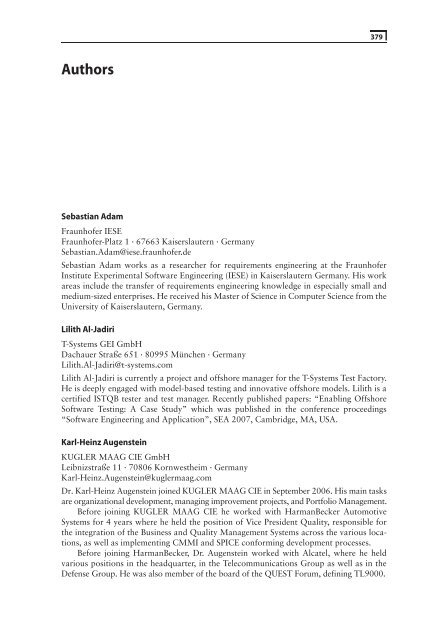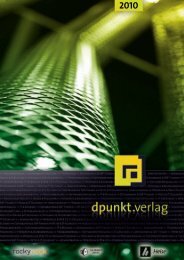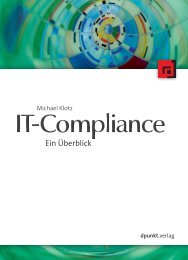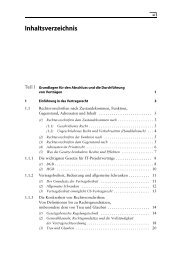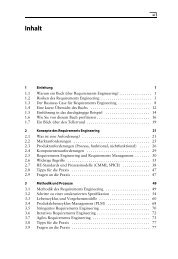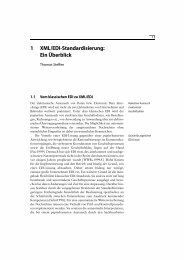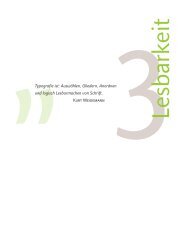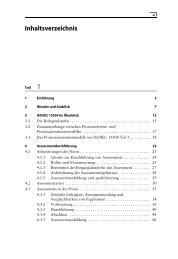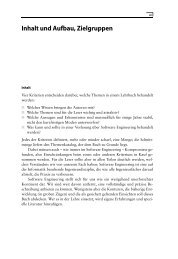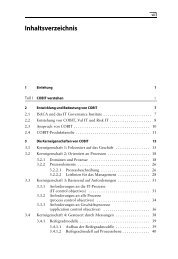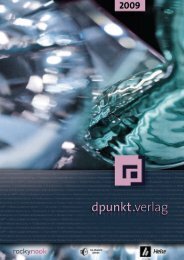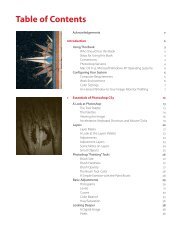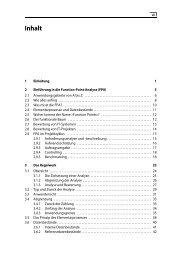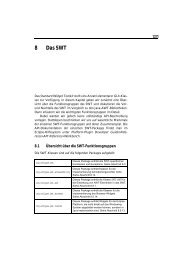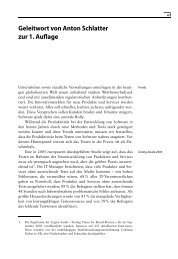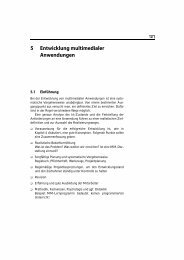Setting Quality Standards
Setting Quality Standards
Setting Quality Standards
Create successful ePaper yourself
Turn your PDF publications into a flip-book with our unique Google optimized e-Paper software.
Authors<br />
Sebastian Adam<br />
Fraunhofer IESE<br />
Fraunhofer-Platz 1 · 67663 Kaiserslautern · Germany<br />
Sebastian.Adam@iese.fraunhofer.de<br />
Sebastian Adam works as a researcher for requirements engineering at the Fraunhofer<br />
Institute Experimental Software Engineering (IESE) in Kaiserslautern Germany. His work<br />
areas include the transfer of requirements engineering knowledge in especially small and<br />
medium-sized enterprises. He received his Master of Science in Computer Science from the<br />
University of Kaiserslautern, Germany.<br />
Lilith Al-Jadiri<br />
T-Systems GEI GmbH<br />
Dachauer Straße 651 · 80995 München · Germany<br />
Lilith.Al-Jadiri@t-systems.com<br />
Lilith Al-Jadiri is currently a project and offshore manager for the T-Systems Test Factory.<br />
He is deeply engaged with model-based testing and innovative offshore models. Lilith is a<br />
certified ISTQB tester and test manager. Recently published papers: “Enabling Offshore<br />
Software Testing: A Case Study” which was published in the conference proceedings<br />
“Software Engineering and Application”, SEA 2007, Cambridge, MA, USA.<br />
Karl-Heinz Augenstein<br />
KUGLER MAAG CIE GmbH<br />
Leibnizstraße 11 · 70806 Kornwestheim · Germany<br />
Karl-Heinz.Augenstein@kuglermaag.com<br />
Dr. Karl-Heinz Augenstein joined KUGLER MAAG CIE in September 2006. His main tasks<br />
are organizational development, managing improvement projects, and Portfolio Management.<br />
Before joining KUGLER MAAG CIE he worked with HarmanBecker Automotive<br />
Systems for 4 years where he held the position of Vice President <strong>Quality</strong>, responsible for<br />
the integration of the Business and <strong>Quality</strong> Management Systems across the various locations,<br />
as well as implementing CMMI and SPICE conforming development processes.<br />
Before joining HarmanBecker, Dr. Augenstein worked with Alcatel, where he held<br />
various positions in the headquarter, in the Telecommunications Group as well as in the<br />
Defense Group. He was also member of the board of the QUEST Forum, defining TL9000.<br />
379
380<br />
Ramesh Babu Shanmugam<br />
Authors<br />
Siemens Information System Ltd · Specialized Testing Services<br />
No. 84, Keonics Electrinics City, Hosur Road · Bangalore 560100 · India<br />
Ramesh.Shanmugam@siemens.com<br />
Ramesh Babu Shanmugam has around 6 years of experience in the design, development<br />
and testing of projects in the Finance, Network, Power Transmission Distribution and<br />
Energy Automation and Medical domains. He is currently working as a test consultant<br />
with Siemens Information Systems Limited, Bangalore, India. Ramesh Babu Shanmugam<br />
is Master of Computer Applications graduate from the University of Madras.<br />
Robert Baggen<br />
TÜV Informationstechnik GmbH · Projekt- und Qualitätsmanagement<br />
Langemarckstraße 20 · 45141 Essen · Germany<br />
r.baggen@tuvit.de<br />
Robert Baggen joined TÜViT in 1999. Since then he has conducted some 20 quality testing<br />
and certification projects for German companies from Telecommunication, Software<br />
Development, Banking, Assurance and the Public Sector. Based on an education as work<br />
and organisational psychologist, Robert is experienced in software quality management,<br />
usability testing and in IT service management.<br />
Petra Barzin<br />
Secorvo Security Consulting GmbH<br />
Ettlinger Strasse 12-14 · 76137 Karlsruhe · Germany<br />
petra.barzin@secorvo.de<br />
Petra Barzin, Diplom-Informatikerin (computer scientist) received her Diploma in computer<br />
science from the Fachhochschule Darmstadt in 1995. From 1995 until 1999 she was<br />
working at GMD (aka FhG) in the research area of Security and Smartcard Technologies.<br />
In 1999 she changed to a leading German vendor for Public Key Infrastructures (PKI)<br />
solutions where she was the head of the security consulting team for four years. Afterwards<br />
she switched into product management and was responsible for the development of<br />
some selected security products. Since October 2004 she has been working as a security<br />
consultant at Secorvo Security Consulting GmbH.<br />
Graham Bath<br />
T-Systems GEI GmbH<br />
Dachauer Straße 651 · 80995 München · Germany<br />
Graham.Bath@t-systems.com<br />
Graham’s experience in testing spans over 25 years and has covered a wide range of<br />
domains and technologies. As a test manager, he has been responsible for the testing of<br />
mission-critical systems in spaceflight, telecommunications and police incident-control.<br />
Graham has designed tests to the highest level of rigor within real-time aerospace systems<br />
such as the Tornado and Eurofighter military aircraft. As a principal consultant for the T-<br />
Systems Test Factory he has mastered the <strong>Quality</strong> Improvement Programs of several major<br />
German companies, primarily in the financial and government sectors. In his current position,<br />
Graham is responsible for the training programme and for introducing innovative<br />
testing solutions to his company’s large staff of testing professionals. Graham is a member
Authors<br />
of the authoring team for the new ISTQB Advanced Level Certified Tester and is a longstanding<br />
member of the German Testing Board, where he chairs the Advanced Level and<br />
Expert Level Working Parties.<br />
Together with Judy McKay, Graham has co-authored the recently published book<br />
“The Software Test Engineer’s Handbook”, which is a study guide for the ISTQB Test<br />
Analyst and Technical Test Analyst Advanced Level certificates.<br />
Medikonda Ben Swarup<br />
Dept. of Computer Science & Systems Engineering · A. U. College of Engineering<br />
Visakhapatnam- 530 003 · Andhra Pradesh · India<br />
bforben@gmail.com<br />
Medikonda Ben Swarup obtained his Bachelors degree in Electronics and Communication<br />
Engineering from Regional Engineering College, Kakaitya University, Warangal, India in<br />
1988 and his Masters degree in Computer Science from the University of Hyderabad,<br />
India, in 1991. He is presently pursuing the doctoral degree in Computer Science from<br />
Andhra University College of Engineering, Visakhapatnam, India.<br />
Volker Bergmann<br />
Volker Bergmann IT Consulting<br />
Hauptstraße 18 · 82008 Unterhaching · Germany<br />
info@bergmann-it.de<br />
Volker Bergmann is an IT consultant for Java Enterprise Systems.<br />
His focus is the design, analysis and optimization of Java Enterprise Applications with<br />
particular design and performance requirements. He promoted major projects (Deutsche<br />
Telekom, Postbank, Interhyp, Payback, O2, Deutsche Bahn) and now utilizes his expertise<br />
in software design and architecture for the development of methods and tools for the<br />
improvement of software quality and performance. Currently his major work is databene<br />
benerator, an open source tool for the generation of load test data.<br />
Frank Blucha<br />
MB-technology GmbH<br />
Kolumbusstraße 19+21 · 71063 Sindelfingen · Germany<br />
Frank.Blucha@mbtech-group.com<br />
Frank Blucha studied electrical engineering at the universities of Bochum and Stuttgart. He<br />
was project manager in national and multi-national projects and worked in several<br />
domains such as telecommunications, defense, transportation, and automotive. Since the<br />
end of 1993 he has been focusing on process improvement especially in project management<br />
and requirements engineering. He is an SEI authorized SCAMPI Lead Appraiser and<br />
CMMI Instructor. Since 2005 he has been the department head and Principal Consultant<br />
at MB-technology GmbH.<br />
381
382<br />
Mark van den Brand<br />
Authors<br />
Laboratory for <strong>Quality</strong> Software (LaQuSo) · Eindhoven University of Technology<br />
P.O. Box 513 · 5600 MB Eindhoven · The Netherlands<br />
m.g.j.v.d.brand@tue.nl<br />
Prof. Dr. Mark van den Brand is a full professor of Software Engineering and Technology<br />
at the Eindhoven University of Technology (TU/e) in the Department of Mathematics and<br />
Computer Science. Furthermore he is the scientific director of the research laboratory<br />
LaQuSo. His current research activities are on generic language technology, model-driven<br />
engineering and reverse engineering. Most of his publications are on generic language<br />
technology and applications in the field of reverse engineering. Mark van den Brand is a<br />
guest editor of a special issue ‘Experimental Software and Toolkits (EST)’ of the journal<br />
Science of Computer Programming.<br />
Daniel Cabrero<br />
Spanish Ministry of Internal Affairs<br />
Spain<br />
dani_mas_d@yahoo.fr<br />
Daniel Cabrero is a technology board advisor (Chief of Unit) at the Traffic Division (Spanish<br />
Ministry of Internal Affairs). He is responsible of the quality assurance of all the applications<br />
developed at the company. Graduated as a computer engineer in 2000 from the<br />
Autónoma University of Madrid, he currently carries out his doctoral research on valuebased<br />
software engineering, more specifically on the appliance of the value-based approach<br />
to software design.<br />
George Din<br />
Fraunhofer FOKUS<br />
Kaiserin-Augusta-Allee 31 · 10589 Berlin · Germany<br />
george.din@fokus.fraunhofer.de<br />
George Din studied Computer Science at the "Politechnica" University of Bucharest and<br />
graduated in 2001. Between 1999 and 2001, he was Socrates granted student at the Computer<br />
Science Department of Freie Universität Berlin. Since 2001, he has been working as<br />
a researcher at Fraunhofer Institute FOKUS where he has been actively involved in R&D<br />
projects on testing, being responsible for developing test concepts, designing and implementing<br />
test systems as well as executing tests with the main focus on TTCN-3 technology.<br />
Between 2003 and 2006 he collaborated with Testing Technologies (spin-off company of<br />
Fraunhofer FOKUS) where he contributed to the development of TTworkbench tool for<br />
TTCN-3. He also led the team which developed the distributed execution environment for<br />
TTCN-3. He wrote research papers on various aspects of testing telecommunication systems<br />
and of developing test systems. He contributed to books and journals often speaks at<br />
TTCN-3 User Conferences and TestCom.<br />
His technical and research work covers TTCN-3 based testing methods and tools,<br />
performance testing and distributed systems. Current research interests are distributed<br />
execution of TTCN-3 tests and performance evaluation of next generation networks with<br />
special focus on IMS.
Authors<br />
Frank Dordowsky<br />
ESG Elektroniksystem- und -Logistik GmbH<br />
Livry-Gargan-Straße 6 · 82256 Fürstenfeldbruck · Germany<br />
Frank.Dordowsky@esg.de<br />
Frank Dordowsky is an avionics systems and software engineer at Elektroniksystem- und<br />
Logistik-GmbH (ESG). His main responsibilities are the definition and the improvement<br />
of system and software development processes and methods. He currently works for Eurocopter<br />
Germany on the implementation of a variant management concept for the NH90<br />
helicopter series. Frank has more than 20 years of experience in systems and software<br />
development for various domains including industry, transport, public sector and aerospace.<br />
He has been working as software and systems engineer on several large avionics<br />
projects including Eurofighter, TIGER, and NH90. Frank has a diploma degree in Mathematics<br />
from Hamburg University.<br />
Joerg Dörr<br />
Fraunhofer IESE<br />
Fraunhofer-Platz 1 · 67663 Kaiserslautern · Germany<br />
Joerg.Doerr@iese.fraunhofer.de<br />
Jörg Dörr is head of the Requirements and Usability Engineering department at the Fraunhofer<br />
Institute Experimental Software Engineering (IESE) in Kaiserslautern, Germany. His<br />
work areas include requirements engineering, with a focus on non-functional requirements.<br />
He received his master of science in Computer Science from the University of Kaiserslautern,<br />
Germany. He is a member of the German computer science society and of the<br />
steering committee in the special interest group "Requirements Engineering".<br />
Reiner R. Dumke<br />
Institute of Distributed Systems · University of Magdeburg<br />
P. O. Box 4120 · 39106 Magdeburg · Germany<br />
dumke@ivs.cs.uni-magdeburg.de<br />
Dr. Reiner R. Dumke currently works at the University of Magdeburg, Germany, as a professor<br />
with software engineering as research field. He is one of the founders of the Software<br />
Measurement Laboratory (SML@b) of the Computer Science Department of the University<br />
of Magdeburg and co-editor of the Metrics News Journal. He is the leader of the<br />
German Interest Group on software metrics and he works as a member of the COSMIC,<br />
DASMA, MAIN, IEEE and ACM communities. He is the author and editor of more than<br />
30 books on programming techniques, software metrics, metrics tools, software engineering<br />
foundations, component-based software development and Web engineering.<br />
383
384<br />
Gregor Engels<br />
Authors<br />
sd&m AG, software design & management<br />
Berliner Straße 76 · 63065 Offenbach · Germany<br />
Department of Computer Science, Software <strong>Quality</strong> Lab · University of Paderborn<br />
Warburger Straße 100 · 33098 Paderborn · Germany<br />
engels@upb.de<br />
Gregor Engels has held the chair for information systems at the University of Paderborn<br />
(Germany) since 1997. He heads the s-lab (Software <strong>Quality</strong> Lab), a public-private-partnership<br />
institute with 8 industrial partners at the University of Paderborn.<br />
Since 2005, he has been the scientific director of the research department of sd&m<br />
AG, Munich (Germany), a software and system house with 1,600 employed software engineers.<br />
His interests are object-oriented modelling techniques, software architectures, quality<br />
assurance techniques, as well as technology transfer approaches bridging the gap<br />
between conceptual scientific results and industrial requirements. He has published more<br />
than 150 scientific articles.<br />
Ayaz Farooq<br />
Institute of Distributed Systems · University of Magdeburg<br />
P. O. Box 4120 · 39106 Magdeburg · Germany<br />
farooq@ivs.cs.uni-magdeburg.de<br />
Ayaz Farooq is a PhD candidate and received a degree in Computer Science in 2005 from<br />
the University of Magdeburg, Germany. Since then he has been working at the Software<br />
Engineering Group of the University of Magdeburg. His research interests include test<br />
process evaluation and improvement, software measurement and software quality management.<br />
He has participated in several international conferences on software process,<br />
software testing, and software measurement.<br />
Stephan Frohnhoff<br />
sd&m AG, software design & management<br />
Berliner Straße 76 · 63065 Offenbach · Germany<br />
Stephan.Frohnhoff@sdm.de<br />
Stephan Frohnhoff has been a member of the Management Executive Committee at sd&m<br />
AG since 2002 and responsible for large custom software development projects in various<br />
sectors. sd&m is a software and consulting house with 1,700 employed software engineers.<br />
He studied physics at the University of Cologne and RWTH Aachen, economics at the<br />
University of Hagen and worked for one year as a scientific employee at the Research<br />
Center Jülich. In 1994 he joined the sd&m AG, working as a software engineer, project<br />
leader and business unit manager. His interests are project management and especially estimation<br />
methods and he has established the Use Case Points method as part of the quality<br />
gate process at sd&m.
Authors<br />
Félix García<br />
Departamento de Tecnologías y Sistemas de Información (UCLM)<br />
Paseo de la Universidad, 4 · 13071 Ciudad Real · Spain<br />
Felix.garcia@uclm.es<br />
Dr. Félix García is an Associate Professor at the University of Castilla-La Mancha<br />
(UCLM). His research interests include business process management, software processes,<br />
software measurement and agile methods. He holds MSc and PhD degrees of the UCLM<br />
in Computer Science, and is a member of the ALARCOS Research Group of that University,<br />
specialized in information systems, databases and software engineering.<br />
Javier Garzás Parra<br />
Kybele Consulting S.L.<br />
C/ La Oliva 18 3-A. · 28231 Las Rozas – Madrid · Spain<br />
Javier.Garzas@kybeleconsulting.com<br />
Dr. Javier Garzás MsC and PhD in Computer Science at the University of Castilla-La Mancha<br />
(UCLM) and CSQE by ASQ. CEO at Kybele-Consulting and lecturer at Rey Juan Carlos<br />
University. His research interests include the Capability Maturity Model Integration,<br />
object-oriented design, and software process and project management. Solid professional<br />
experience on software factories, software quality, software process improvement, and<br />
testing.<br />
Georg Götz<br />
sepp.med gmbh<br />
Gewerbering 9 · 91341 Röttenbach · Germany<br />
georg.goetz@sepp.med.de<br />
Georg Götz completed his degree in computer science in 2005. Since then he has been<br />
working in the areas of quality assurance and software development at the sepp.med<br />
gmbh. His field of activities there includes working in research and development projects<br />
within the scope of his dissertation. In addition he oversees diploma and master thesis<br />
projects and works as a trainer for Certified Tester courses.<br />
Helmut Götz<br />
Siemens AG · Corporate Technology · CT SE 1<br />
Guenther-Scharowsky-Straße 1 · 91058 Erlangen · Germany<br />
helmut.h.goetz@siemens.com<br />
Helmut Götz is a senior engineer at Siemens Corporate Technology – Department Development<br />
Techniques (CT SE 1) in Erlangen. His main focus is in the area of software testing<br />
for products and systems. Especially model-based testing approaches as well as testing of<br />
product lines are the core knowledge areas he is working in. One major objective in his<br />
work is the integration of either commercial as well as proprietary tools to support the<br />
new testing solutions.<br />
385
386<br />
Baris Güldali<br />
Authors<br />
Department of Computer Science, Software <strong>Quality</strong> Lab · University of Paderborn<br />
Warburgerstraße 100 · 33098 Paderborn · Germany<br />
bguldali@s-lab.upb.de<br />
Baris Güldali is researcher and doctoral student at Software <strong>Quality</strong> Lab (s-lab) at University<br />
of Paderborn. His main research field is model-based testing in the domain of business<br />
information systems. He has a B.Sc. degree from the Computer Engineering department at<br />
Middle East Technical University in Ankara and a ‘Diplom-Informatiker’ degree from the<br />
University of Paderborn. He worked as a software developer for the industry and as a<br />
technical assistant at the University of Paderborn. He currently works for s-lab in industrial<br />
projects on test process optimization, test management and test automation.<br />
Hans Hartmann<br />
OBJENTIS Software Integration GmbH<br />
Mariahilfer Straße 3 · 1060 Vienna · Austria<br />
Hans.Hartmann@objentis.com<br />
Hans Hartmann is the test director of OBJENTIS Software Integration GmbH, a company<br />
concentrating on the test consulting and the development of test methodologies. Formerly<br />
he was the chief software architect for Generali, one of the world's leading insurance companies.<br />
Having studied industrial electronics at the TU Vienna, he has 30 years of experience<br />
in system and application computer programming including several patents in the<br />
field of micro-photometry. He is currently lecturing software architecture at the TU Leipzig<br />
and at the TU Vienna. He has worked as a technical trainer all over Europe, the former<br />
Soviet Union, China, Japan and the United States.<br />
Bill Hasling<br />
Siemens Corporate Research<br />
Princeton, New Jersey · USA<br />
bill.hasling@siemens.com<br />
Bill Hasling is a Senior Member of Technical Staff at Siemens Corporate Research in Princeton,<br />
New Jersey. He works in researching and applying leading edge technologies to<br />
projects in a variety of Siemens divisions. He worked on the original category partition<br />
method of testing developed at Siemens Corporate Research. Recently, he has been working<br />
in the area of Use Case based model-based testing.<br />
Klaus-Dieter Hess<br />
Eurocopter Deutschland GmbH · Research & Development<br />
ETZCR – Mission System and Research<br />
81663 Munich · Germany<br />
Klaus-Dieter.Hess@eurocopter.com<br />
Klaus-Dieter Hess is an appointed software configuration manager at Eurocopter Deutschland<br />
GmbH. He is responsible for the definition and improvement of software processes,<br />
methods and tools for avionics software development of the military helicopter program<br />
NH90. Klaus has more than 20 years of experience in software development, field<br />
test, and commissioning in the domains of environmental technology (electrostatic precipitation<br />
plants), production automation (factory control system for plain metal punching
Authors<br />
machines), and finally he was responsible for the software configuration management in<br />
the domains of special equipment manufacturing (SMD placement systems) and aerospace.<br />
Klaus has a diploma degree in high voltage technology from the Technical University<br />
of Munich.<br />
Johannes Huth<br />
SQS Software <strong>Quality</strong> Systems AG · Business Unit Industry + Engineering<br />
Wendenstraße 21a · 20097 Hamburg · Germany<br />
johannes.huth@sqs.de<br />
Dr.-Ing. Johannes Huth started working at SQS Software <strong>Quality</strong> Systems AG in October<br />
1999. His main subject is the area of safety management in different industrial branches<br />
like railway industry, avionics industry or medical devices.<br />
Michael Kain<br />
Acando GmbH<br />
Millerntorplatz 1 · 20359 Hamburg · Germany<br />
michael.kain@acando.de<br />
Michael Kain works as a consultant for enterprise application architecture at Acando. He<br />
is a specialist in the development of web applications and test frameworks. He is an author<br />
of various articles on test automation and has published a book on the Selenium Test<br />
Framework.<br />
Raghuram Kolli<br />
Maveric Systems Ltd.<br />
Fifth floor, Fagun Mansion · 74- Ethiraj Salai · Egmore · Chennai – 600105 · India<br />
raghur@maveric-systems.com<br />
Raghuram is currently engaged in the development of Maveric’s proprietary test design<br />
workbench Testac. He has 3 years of experience in software testing. Has written and presented<br />
whitepapers on:<br />
‘Applying Model Testing in UAT context’: Step-In International conference. Bangalore;<br />
‘Model-Based Testing Approach to Manage UAT Challenges effectively’: Conquest<br />
2008, Germany.<br />
His core area of expertise lies in the retail banking domain. He has been involved in<br />
various testing projects that included user acceptance testing of Oracle ERP Solution at<br />
GECIS, Hyderabad; system integration testing of CSIPS – Elixir pension plans at Mastek,<br />
Mumbai; regression testing of CSIPS – Elixir pension plans at Mastek, Mumbai. He also<br />
functioned as the test lead of the offshore team of Maveric engaged in the user acceptance<br />
testing of Flexcube Core Banking Solution for Dubai Islamic Bank, Dubai. He has also<br />
performed the role of a <strong>Quality</strong> Analyst involved in the review and approval of test design<br />
prepared by the Maveric team engaged in user acceptance testing of the T24 Core Banking<br />
Application at Bank Muscat, Muscat. Has recently been involved with Bank Muscat for<br />
defining the process controls for interfaces.<br />
He is currently part of the functional team involved in the development and implementation<br />
of the new UAT approach in Maveric, aligned with the adopted model-based<br />
testing approach. Raghuram is an MBA Finance Graduate from Sri Sathya Sai Institute of<br />
Higher Learning.<br />
387
388<br />
Elena Korshunova<br />
Authors<br />
Laboratory for <strong>Quality</strong> Software (LaQuSo) · Eindhoven University of Technology<br />
P.O. Box 513 · 5600 MB Eindhoven · The Netherlands<br />
Elena Korshunova graduated from Bauman Moscow State Technical University in 2001<br />
on a B.Sc. thesis related to the topic of design and development of informational systems<br />
for distant education. After that, she received a grant from DAAD-Siemens CEE Scholarship<br />
Program. It allowed her to continue her studies in Duisburg-Essen University, Germany<br />
(2001 - 2004). She wrote her M.Sc. thesis in the group of Prof. H.U. Hoppe on the<br />
subject of "Metadata Generation and Contextual Retrieval Mechanisms for Educational<br />
Modeling Tools". In 2004, she was invited to participate in a "Software Technology"<br />
post-master program from Stan Ackermans Institute, Eindhoven University of Technology.<br />
After receiving a PDEng degree in 2006, she started to work in Topic Embedded Systems.<br />
She did several projects for Océ, which were related to design and development of<br />
user interfaces for multi-functional printers. Since 2008, she has worked in the company<br />
Docdata Payments in the area of development of online payment solutions.<br />
Andreas Kramp<br />
Acando GmbH<br />
Millerntorplatz 1 · 20359 Hamburg · Germany<br />
andreas.kramp@acando.de<br />
Andreas Kramp is the responsible person at Acando for the subjects test management and<br />
agile methods and development. Before joining Acando he was the head of test and quality<br />
management for various IT projects of a major bank in Germany.<br />
Detlef Kraska<br />
Universitätsklinikum Erlangen<br />
Medizinisches Zentrum für Informations- und Kommunikationstechnik (MIK)<br />
Abteilung Klinische Anwendungen und Kommunikation<br />
Krankenhausstraße 12 · 91054 Erlangen · Germany<br />
Detlef Kraska is Team Leader for Clinical Communication in the MIK, Erlangen University<br />
Hospital.<br />
Michel Löhr<br />
Saxonia Systems AG<br />
Könneritzstrasse 5 · 01067 Dresden · Germany<br />
michael.loehr@saxsys.de<br />
Michel’s knowledge and experience is based on more than thirteen years of IT related<br />
experience in industry, financial, telco, public and semiconductor sectors in the Netherlands,<br />
New Zealand and Germany. He worked for Rational Software (later acquired by<br />
IBM) and gained experience in the complete software lifecycle like requirements, configuration,<br />
and change management, next to processes as RUP and Agile (Scrum). In Germany<br />
he added experience in test management and test automation on the basis of his software<br />
development experience.
Authors<br />
Tomás Martínez-Ruiz<br />
Departamento de Tecnologías y Sistemas de Información (UCLM)<br />
Paseo de la Universidad, 4 · 13071 Ciudad Real · Spain<br />
Tomas.Martinez@uclm.es<br />
Tomás Martínez-Ruiz is a MSc of Computer Science at the University of Castilla-La Mancha<br />
(UCLM). He is a PhD student at the ALARCOS Research Group of that University.<br />
His research interests are software process improvement, software process lines and<br />
aspect-oriented software.<br />
Bernhard Merkle<br />
SICK AG · Research & Development · Software Engineering<br />
Erwin-Sick-Straße 1 · 79183 Waldkirch · Germany<br />
Bernhard.Merkle@sick.de<br />
Bernhard Merkle works as a software architect and engineer in Research & Development<br />
at one of the world’s leading producers of sensors and sensor solutions. He serves as an<br />
internal consultant for the complete software development cycle and is responsible for<br />
methods selection, tool evaluation and introduction. In his previous job, he worked at a<br />
major MDA tool vendor where he accomplished client projects using MDA and modelling<br />
languages and gave trainings on MDA, J2EE, CORBA, Java and C++. He regularly writes<br />
technical articles on those and new technologies in IT journals and also gave sessions at<br />
various conferences (e.g. ACCU, IX and OOP).<br />
Armin Metzger<br />
sepp.med gmbh<br />
Gewerbering 9 · 91341 Röttenbach · Germany<br />
Péter Pálffy<br />
Universitätsklinikum Erlangen<br />
Medizinisches Zentrum für Informations- und Kommunikationstechnik (MIK)<br />
Abteilung Klinische Anwendungen und Kommunikation<br />
Krankenhausstraße 12 · 91054 Erlangen · Germany<br />
peter.palffy@uk-erlangen.de<br />
Dr. Péter Pálffy was born on 16.7.1971 in Etterbeek (Belgium). He studied physics and<br />
informatics with medical information processing at the Friedrich Alexander University in<br />
Erlangen (Germany) from 1990 to 1997. From 1997 to 2002 he implemented the OR system<br />
in the Erlangen University hospital. Since 2003, Dr. Palffy has been the Assistant Head<br />
of Department for Clinical Applications and Communication and <strong>Quality</strong> Assurance<br />
Mandatory. He earned the doctorate in 2008 with a dissertation on OR systems.<br />
389
390<br />
Marija Petković<br />
Authors<br />
Laboratory for <strong>Quality</strong> Software (LaQuSo) · Eindhoven University of Technology<br />
P.O. Box 513 · 5600 MB Eindhoven · The Netherlands<br />
Marija Petković received a MSc degree at University of Nis, Serbia in 1996 and a PDEng<br />
degree at University of Twente in Enschede, The Netherlands, in 2001. She worked for<br />
LaQuSo as a leader of the development team of software system supporting verification<br />
and validation of software. In addition, she has supervised TWAIO students doing their<br />
final projects on Reverse Engineering. She also worked as a consultant in projects on software<br />
quality.<br />
Mario Piattini Velthuis<br />
Departamento de Tecnologías y Sistemas de Información (UCLM)<br />
Paseo de la Universidad, 4 · 13071 Ciudad Real · Spain<br />
Mario.Piattini@uclm.es<br />
Dr. Mario Piattini Velthuis has an MSc. and PhD in Computer Science from the Technical<br />
University of Madrid and MsC in Psychology from the UNED, and is a CISA, CISM and<br />
CGEIT by ISACA (Information System Audit and Control Association). CSQE by ASQ.<br />
He is a professor in the Department of Computer Science at the University of Castilla-La<br />
Mancha, in Ciudad Real, Spain. Author of several books and papers on software engineering,<br />
databases and information systems, he leads the ALARCOS research group of the<br />
Department of Information Systems and Technologies at the University of Castilla-La<br />
Mancha. His research interests are: software process improvement, software metrics, software<br />
maintenance and security in information systems.<br />
Stephan Pietsch<br />
Testing Technologies IST GmbH<br />
Michaelkirchstraße 17/18 · 10179 Berlin · Germany<br />
pietsch@testingtech.com<br />
Stephan Pietsch co-founded Testing Technologies in the year 2000, a Berlin-based company<br />
with focus on the development and promotion of TTCN-3 tools and TTCN-3-based<br />
test solutions. Since then he has been heading Testing Technologies as a Chief Technology<br />
Officer.<br />
Mr. Pietsch had worked as a researcher and project leader at Fraunhofer Institute<br />
FOKUS Berlin for more than six years. During this time, he became a senior expert in systematic<br />
testing, in particular in the area of TTCN-3. Stephan Pietsch studied Electrical<br />
Engineering and holds a Master degree in Electrical Engineering from Technical University<br />
Berlin.<br />
Alexander Poth<br />
Software <strong>Quality</strong> Systems AG<br />
Stollwerckstraße 11 · 51149 Köln · Germany<br />
Alexander.Poth@sqs.de<br />
Alexander Poth studied computer engineering at the Technical University of Berlin and the<br />
Universidad Politecnica of Madrid. Since 2003 he has been working on requirements engineering<br />
methods and concepts. In 2004 he qualified as an iNTACS SPICE assessor, in 2006<br />
as an iSQI Professional for Project Management and in 2007 as an ISTQB Test Manager
Authors<br />
and iREB Professional for Requirements Engineering. Since 2007 he has been working as<br />
a senior consultant for the SQS AG with focus on quality management. Since 2004, he has<br />
been working as a quality management consultant and engineer. Previously he worked as<br />
a software developer from 2000 for a telecommunications OEM and an ERP System<br />
OEM.<br />
Joseph Prabhu Missier<br />
EMC2 Data Storage Systems · Subramanya Arcade<br />
Bannerghatta Road · Bangalore – 560 029 · India<br />
prabhu.missier@technologist.com<br />
Joseph Prabhu Missier is a Principal Software Engineer in EMC2 Data Storage Systems<br />
(India) Pvt. Limited, where he designs and develops data storage solutions. Having been a<br />
part of the Software Industry in India for more than 8 years, he has amassed varied experience<br />
spanning from Software Services and Product development across various domains<br />
such as Avionics, Automotive, Medical and Embedded Systems. He also has an MBA<br />
which helps him understand the business dynamics of software services. A keen observer<br />
of mergers and acquisitions he is passionate about traversing the globe, and relaxes playing<br />
the guitar and driving in and around scenic Bangalore.<br />
Moisés Rodríguez Monje<br />
Kybele Consulting S.L.<br />
C/ La Oliva 18 3-A. · 28231 Las Rozas – Madrid · Spain<br />
moises.rodriguez@kybeleconsulting.com<br />
Moisés Rodríguez is a MSc of Computer Science at the University of Castilla-La Mancha<br />
(UCLM). He works in Kybele Consulting as a technical software consultant and he is specialized<br />
in capability and maturity models of software quality. Author of several papers on<br />
software metrics and software requirements, his research interests are: software process<br />
improvement, software quality, metrics and testing.<br />
Ina Schieferdecker<br />
Technical University of Berlin<br />
Straße des 17. Juni 135 · 10623 Berlin · Germany<br />
ina@cs.tu-berlin.de<br />
Prof. Dr.-Ing. Ina Schieferdecker studied Mathematical Computer Science at Humboldt-<br />
University Berlin and did her PhD in 1994 at Technical University Berlin on performanceextended<br />
specifications and analysis of QoS characteristics. Since 1997, she is heading the<br />
Competence Center for Testing, Interoperability and Performance (TIP) at the Fraunhofer<br />
Institute on Open Communication Systems (FOKUS), Berlin and is now heading the Competence<br />
Center Modelling and Testing for System and Service Solutions (MOTION).<br />
She has been a professor for Engineering and Testing of Telecommunication Systems<br />
at Technical University Berlin since 2003. Since 1994, Prof. Schieferdecker has worked in<br />
the area of design, analysis, testing and evaluation of communication systems using specification-based<br />
techniques like UML (Unified Modelling Language), MSC (Message<br />
Sequence Charts) and TTCN-3 (Testing and Test Control Notation). Prof. Schieferdecker<br />
authored many scientific publications in the area of system development and testing. She is<br />
a co-founder of the Testing Technologies IST GmbH, Berlin and member of the German<br />
Testing Board. In 2004, she received the Alfried Krupp von Bohlen and Halbach Award<br />
for Young Professors.<br />
391
392<br />
Herbert Schippers<br />
Authors<br />
TÜV Informationstechnik GmbH · Projekt- und Qualitätsmanagement<br />
Langemarckstraße 20 · 45141 Essen · Germany<br />
h.schippers@tuvit.de<br />
Herbert Schippers joined TÜV in 1992. Since this time, Herbert conducted quality projects<br />
for a vast number of German software companies from the public sector, telecommunication,<br />
energy supply and car industry. He was the TÜViT lead assessor in the Business<br />
ByDesign project. Herbert graduated in Information Science. He is a certified expert in<br />
ITIL and SPICE methods.<br />
Robert Schlieder<br />
ThyssenKrupp Presta Steering AG<br />
Essanestrasse 10 · 9492 Eschen · Liechtenstein<br />
robert.schlieder@thyssenkrupp.com<br />
Robert Schlieder is the responsible person for process development and knowledge management<br />
within ThyssenKrupp Presta Steering AG, Liechtenstein.<br />
After studying Electrical Engineering at the TU Dresden he became a management<br />
trainee in ThyssenKrupp Automotive AG. In 2004, he became a member of ThyssenKrupp<br />
Presta Steering AG, Liechtenstein.<br />
Robert Schlieder is a competent SPICE assessor and manages the worldwide Process-<br />
Improvement-Program of TK Presta Steering AG with more than 30 projects for the sectors<br />
software, electrics/ electronic, safety, mechatronics, project an quality management.<br />
He supervises a distributed team of process developers und process coaches. The strategic<br />
focus is on the selection of the processes according to the HIS-Scope of Automotive SPICE<br />
as well as on the safety standards IEC 61508/ WD 26262.<br />
Andreas Schmietendorf<br />
Berlin School of Economics · Faculty of Company-Linked Programmes<br />
Neue Bahnhofstraße 11-17 · 10245 Berlin · Germany<br />
schmiete@ivs.cs.unimagdeburg.de<br />
Dr. Andreas Schmietendorf received his PhD degree in computer science from the University<br />
of Magdeburg in 2001. He currently works at the University of Applied Sciences in<br />
Berlin, Germany, as a professor with performance engineering as research field. Furthermore,<br />
he is a consultant for T-Systems International in the area of IT Service Management.<br />
He works as a member for DASMA, the Central Europe Computer Measurement Group<br />
(CECMG) and the German Interest Group on software metrics.<br />
Panchumarthy Seetha Ramaiah<br />
Dept. of Computer Science & Systems Engineering · A. U. College of Engineering<br />
Visakhapatnam- 530 003 · Andhra Pradesh · India<br />
psrama@gmail.com<br />
Dr. Panchumarthy Seetha Ramaiah obtained his PhD in Computer Science from Andhra<br />
University in 1990. He is presently working as a professor of Computer Science in the<br />
department of Computer Science and Systems Engineering, Andhra University College of<br />
Engineering, Visakhapatnam, India. He is the Principal Investigator for several Defense<br />
R&D projects and Department of Science and Technology projects of the Government of
Authors<br />
India in the areas of Embedded Systems and Robotics. He has published six journal<br />
papers, and presented twelve International Conference papers in addition to twenty<br />
papers at National Conferences in India.<br />
Alexander Serebrenik<br />
Laboratory for <strong>Quality</strong> Software (LaQuSo) · Eindhoven University of Technology<br />
P.O. Box 513 · 5600 MB Eindhoven · The Netherlands<br />
a.serebrenik@tue.nl<br />
Dr. Alexander Serebrenik has obtained his PhD in Computer Science from Katholieke Universiteit<br />
Leuven, Belgium (2003) and his M.Sc. in Computer Science from the Hebrew<br />
University, Jerusalem, Israel.<br />
Dr. Serebrenik has co-authored more than sixty scientific papers. His areas of expertise<br />
include program analysis and transformation, process modeling and verification. Furthermore,<br />
Dr. Serebrenik has been involved in a series of industrial projects pertaining to<br />
software quality assessment.<br />
Hans Günter Siebert<br />
TÜV Informationstechnik GmbH · Projekt- und Qualitätsmanagement<br />
Langemarckstraße 20 · 45141 Essen · Germany<br />
h.siebert@tuvit.de<br />
Hans Günter Siebert joined TÜV in 1981. He started with TÜViT as an experienced software<br />
project leader for CAD software. Later on, Hans Günter conducted a number of<br />
highly visible test projects for an international customer. He is expert in IT governance,<br />
ITIL and information security. Hans Günter holds a diploma in Physics.<br />
Daniel Simon<br />
SQS Software <strong>Quality</strong> Systems AG<br />
Stollwerckstrasse 11 · 51149 Köln · Germany<br />
daniel.simon@sqs.de<br />
Dr. Daniel Simon has been working with SQS AG for more than 4 years.<br />
He is the head of the Application Intelligence competence center. These services focus<br />
on creating metrics-based transparency on applications. Starting from technical parameters,<br />
he supports controlling activities in IT-projects by integrating different data sources<br />
into one global controlling system.<br />
Frank Simon<br />
SQS Software <strong>Quality</strong> Systems AG<br />
Stollwerckstrasse 11 · 51149 Köln · Germany<br />
frank.simon@sqs.de<br />
Dr. Frank Simon has been working with SQS AG for more than 8 years.<br />
Starting from technical analyses of large IT-systems, he promotes a very holistic<br />
approach in the context of quality assurance and improvement to ensure project success.<br />
Today, Frank Simon is the head of the group-wide SQS-Research and Innovation unit. In<br />
this context, he works on creating new services and collecting best-practice catalogues.<br />
393
394<br />
Michael Stahl<br />
Authors<br />
Intel Electronics (74) Ltd.<br />
6 Hamarpe St. · Jerusalem 91031 · Israel<br />
michael.stahl@intel.com<br />
Michael Stahl is a software validation architect at Intel.<br />
An 18 years veteran, Michael is working in the Mobile Wireless Group, validating the<br />
software that controls the wireless component of Intel’s Centrino platform.<br />
Before starting his career in SW testing (in 2000), Michael worked at Intel’s manufacturing<br />
facility in Jerusalem, Israel, as a chip-level test engineer.<br />
Michael is a member of the Executive Board of the Israeli Test Certification Board<br />
(ITCB), chairs the Advisory board of this organization, and holds a full Advanced Level<br />
ISTQB Certification.<br />
Bogdan Stanca-Kaposta<br />
Testing Technologies IST GmbH<br />
Michaelkirchstraße 17/18 · 10179 Berlin · Germany<br />
stanca@testingtech.com<br />
Bogdan Stanca-Kaposta joined Testing Technologies in 2004. He is involved in the development<br />
of TTworkbench, a powerful full-featured integrated test development and execution<br />
environment, and of TTmodeler, which integrates the model-based system and test<br />
design and creates a direct, automated connection to TTworkbench.<br />
Previously, Bogdan Stanca-Kaposta worked in the medical visualization domain at the<br />
Zuse Institute Berlin. He studied Computer Science at the Free University Berlin and Physics<br />
at the West University Timisoara.<br />
Diana Vega<br />
Technical University of Berlin<br />
Straße des 17. Juni 135 · 10623 Berlin · Germany<br />
vegadiana@cs.tu-berlin.de<br />
Diana Vega studied Computer Science at the “Politehnica” University of Bucharest Romania.<br />
She graduated in 2004 with a diploma degree (Dipl.-Inform.) developing the graduation<br />
project at Fraunhofer Fokus.<br />
Since January 2005 she has being working as a researcher at Technical University Berlin<br />
doing her research activity in collaboration with MOTION department from Fraunhofer<br />
Fokus Institute supervised by Prof. Dr. Ina Schieferdecker.<br />
The current focus of her research is oriented towards quality assessment in software<br />
engineering and testing (i.e. among quality models, metrics, coverage, formal methods,<br />
etc.). The work done so far in this direction covers approaches to effectiveness assessment<br />
of test specifications written in TTCN-3 language by contributing to the definition of a<br />
quality model for test specifications and test data metrics and variance measurements. Her<br />
technical and academic interests include test methods and techniques used in TTCN-3 test<br />
specifications, Adapter and CoDec implementation, testing tools and technologies such as<br />
TTworkbench platform, TPTP Platform, TTCN-3 EMF-based Metamodel, etc. Further<br />
investigations she did on web services testing, model-based testing and the associated formal<br />
methods applied to this field.
Authors<br />
Hendrik Voigt<br />
Department of Computer Science, Software <strong>Quality</strong> Lab · University of Paderborn<br />
Warburgerstraße 100 · 33098 Paderborn · Germany<br />
hvoigt@upb.de<br />
Hendrik Voigt studied Business Computing at the University of Paderborn from 1998-<br />
2003. He finished with a Diploma Thesis on model-based analysis of executable business<br />
processes for web services. Since then, he has been working as a researcher at the chair for<br />
Information Systems of Prof. Dr. Gregor Engels. Between 2004 and 2006, he was engaged<br />
in the BMBF-funded IMMOS project (Integrated Method for the Model-based Development<br />
of Automotive Control Units) focusing on requirements engineering aspects. Currently,<br />
he is finishing his PhD thesis on assessing the quality of software models.<br />
Bernhard Wentz<br />
Universitätsklinikum Erlangen<br />
Medizinisches Zentrum für Informations- und Kommunikationstechnik (MIK)<br />
Abteilung Klinische Anwendungen und Kommunikation<br />
Krankenhausstraße 12 · 91054 Erlangen · Germany<br />
Dr. Bernhard Wentz is the Head of Department for Clinical Applications and Communication<br />
of MIK, Erlangen University Hospital.<br />
395


